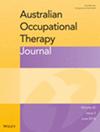Comparison of CO-OP and goal-directed training on occupational performance and functional status in children with cerebral palsy: Three-armed randomised trial
Abstract
Introduction
Cerebral palsy (CP) is a neurological disorder that impacts motor skills and daily functioning in children. While conventional occupational therapy aims to improve these areas, newer approaches like ‘Cognitive Orientation to Daily Occupational Performance’ (CO-OP) and ‘Goal-Directed Training’ (GDT) show promise. However, their comparative effectiveness in enhancing occupational performance and functional status in children with CP remains underexplored. This study aimed to investigate and compare the effects of the CO-OP and GDT on the occupational performance and functional status of children with CP.
Methods
Sixty children were randomly assigned to three intervention groups: CO-OP approach in addition to conventional occupational therapy (COT) (Group A; n = 20), GDT in addition to COT (Group B, n = 20), and only COT (Group C; n = 20). The outcomes regarding occupational performance via the Canadian Occupational Performance Measure and functional status via the Paediatric Evaluation of Disability Inventory were evaluated by the blind evaluators before and after the interventions. All participants received two sessions per week over a 12-week period.
Consumer and Community Involvement
No consumer and community involvement in these studies.
Results
All groups demonstrated statistically significant improvements in occupational performance and functional status (p < 0.001). Between-group comparisons revealed that Group A achieved greater improvements in occupational performance and functional status, which particularly in the areas of self-care, mobility, and total Paediatric Assessment of Disability Inventory (PEDI) scores (p < 0.05), compared to the other groups.
Conclusions
Although significant gains were achieved on occupational performance and functional status levels of both the CO-OP approach and GDT, it was revealed that the group receiving the CO-OP approach had superior effects.
PLAIN LANGUAGE SUMMARY
Cerebral palsy (CP) is a condition that affects how children move and use their muscles. It can make everyday tasks like getting dressed or playing more difficult. Occupational therapy helps children with CP build their skills and become more independent in daily life.
This study looked at two types of therapy: cognitive orientation to daily occupational performance (CO-OP) and goal-directed training (GDT). The aim was to find out which approach worked better for improving everyday activities and skills in children with CP.
The results showed that the children who took part in the CO-OP program made the most progress. They improved more in both daily tasks and skills compared to the children who received GDT. Both groups showed some improvement, but CO-OP had stronger results.
These findings suggest that CO-OP could be a helpful part of therapy programs for children with CP. It may support them in doing more things on their own. More research with larger groups of children is needed to learn more about how these therapies work in the long term.


 求助内容:
求助内容: 应助结果提醒方式:
应助结果提醒方式:


